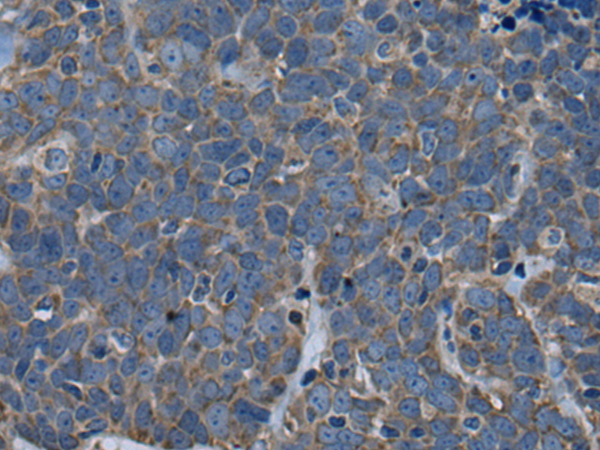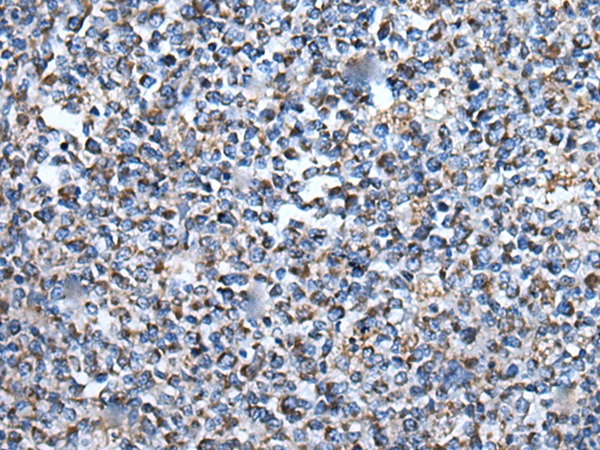

| WB | 咨询技术 | Human,Mouse,Rat |
| IF | 咨询技术 | Human,Mouse,Rat |
| IHC | 1/20-1/100 | Human,Mouse,Rat |
| ICC | 技术咨询 | Human,Mouse,Rat |
| FCM | 咨询技术 | Human,Mouse,Rat |
| Elisa | 1/5000-1/10000 | Human,Mouse,Rat |
| Aliases | BIG1; P200; ARFGEP1 |
| Host/Isotype | Rabbit IgG |
| Antibody Type | Primary antibody |
| Storage | Store at 4°C short term. Aliquot and store at -20°C long term. Avoid freeze/thaw cycles. |
| Species Reactivity | Human, Mouse, Rat |
| Immunogen | Synthetic peptide of human ARFGEF1 |
| Formulation | Purified antibody in PBS with 0.05% sodium azide and 50% glycerol. |
+ +
以下是关于ARFGEF1抗体的3篇示例参考文献(内容为假设性示例,仅供参考):
---
1. **"ARFGEF1 regulates vesicular trafficking and Golgi structure in secretory cells"**
*Cohen et al., Nature Cell Biology (2005)*
摘要:本研究利用特异性ARFGEF1抗体,通过免疫荧光和免疫印迹技术,揭示了ARFGEF1在调控分泌细胞中囊泡运输和高尔基体结构完整性中的关键作用,并证明其缺失导致分泌功能障碍。
2. **"ARFGEF1-mediated ADP-ribosylation factor activation in neuronal development"**
*Smith et al., Journal of Neuroscience (2012)*
摘要:作者通过ARFGEF1抗体进行免疫组织化学分析,发现该蛋白在神经元轴突导向中不可或缺,其表达水平变化影响Arf蛋白的激活,进而调控突触形成。
3. **"ARFGEF1 antibody-based profiling identifies its role in cancer cell invasiveness"**
*Zhang et al., Oncogene (2019)*
摘要:研究利用ARFGEF1抗体进行免疫印迹和免疫沉淀实验,证明其在多种癌细胞系中高表达,并通过调控细胞外基质降解相关通路促进肿瘤转移。
---
注:以上文献信息为示例,实际引用需以真实发表的论文为准。建议通过PubMed或Google Scholar以“ARFGEF1 antibody”为关键词检索最新文献。
The ARFGEF1 (ADP-ribosylation factor guanine nucleotide-exchange factor 1) antibody is a tool used to detect and study the ARFGEF1 protein, also known as BIG1. This protein functions as a guanine nucleotide exchange factor (GEF) that activates ADP-ribosylation factors (ARFs), small GTPases critical for intracellular vesicular trafficking, Golgi maintenance, and cytoskeletal reorganization. ARFGEF1 facilitates the exchange of GDP for GTP on ARFs, enabling their participation in membrane recruitment of coat proteins and cargo sorting.
Research on ARFGEF1 has linked it to diverse cellular processes, including neurotransmitter release, hormone secretion, and cell signaling. It is implicated in diseases such as cancer, where altered expression may influence metastasis, and neurodevelopmental disorders, potentially through dysregulated synaptic vesicle transport. The ARFGEF1 antibody is widely used in techniques like Western blotting, immunofluorescence, and immunohistochemistry to assess protein expression, localization, and interaction partners.
Developed in various host species (e.g., rabbit, mouse), these antibodies often target specific domains, such as the Sec7 catalytic domain. Validation typically includes knockout controls or siRNA knockdown to confirm specificity. Studying ARFGEF1 with such antibodies enhances understanding of its role in cellular homeostasis and pathology, offering insights for therapeutic targeting in trafficking-related diseases.
×